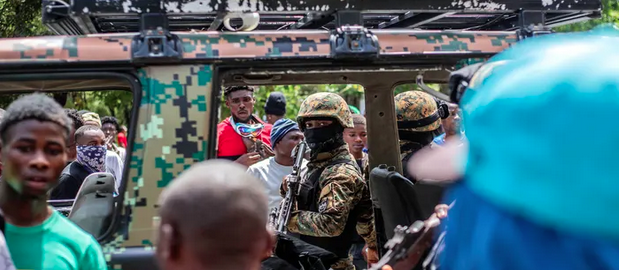Details emerge about foreign hit squad accused of being behind assassination of Jovenel Moïse

Key members of the hit squad allegedly behind the assassination of Haiti’s president Jovenel Moïse had been in the country for about three months, apparently preparing their attack, with others joining from the Dominican Republic last month, according to Haitian judicial authorities investigating the assassination.
As new details emerged about the murder of Moïse, 53, in his private residence in Pétion-Ville in the hills above the capital, Port-au-Prince, it emerged the alleged assassins – including two joint US-Haitian nationals resident in Florida, and about two dozen Colombians – had assembled a cache of weapons, money, mobile phones and other equipment, including rental cars.
According to a judicial official quoted in the Haitian media, one of the two Americans arrested, James Solages, told investigators he had become involved after “finding the job on the internet” but had believed he was to work as an interpreter for the mostly foreign group. Solages reportedly claimed he had believed the group’s mission was to arrest the president of Haiti, rather than to murder him.
Also reportedly among the items found was a chequebook in the name of Moïse and his wife, Martine, who was also badly injured in the attack.
According to Judge Clément Noël, interviewed by the Haitian newspaper Le Nouvelliste, the two Americans said after their arrest that “the mission was to arrest President Jovenel Moïse, in the execution of a warrant from an investigating judge, not to kill him.”
According to Haitian authorities, the group comprised up to 28 foreign mercenaries, including retired Colombian soldiers, some of whom were killed while others detained after a gun battle at a house in the capital Port-au-Prince where they had taken refuge.
Colombia’s defence minister, Diego Molano, said at least six members of the hit squad appeared to be Colombian ex-soldiers, and that he had ordered the army and police to help with the investigation.
On Friday, the Colombian newspaper El Tiempo identified one of the arrested Colombians as Manuel Antonio Grosso Guarín, a former member of the army’s elite urban counter-terrorism special forces group. El Tiempo, which said it had been given access to a confidential report provided to Haitian authorities, said the former special forces operative had flown into the Dominican resort town of Punta Cana on the afternoon of 4 June, with at least three other former members of the Colombia armed forces, before crossing by land into Haiti two days later.
Grosso Guarín appears to have found time for sight-seeing in the Dominican Republic in the hours before driving west towards his alleged mission in Haiti. Photographs posted on his Facebook account show the Colombian posing by landmarks including the presidential National Palace in the capital, Santo Domingo. One image, posted on 6 June, shows him standing by the palace’s outer gates beside a warning sign that reads: “Only authorized personnel. Stop. Turn your lights on. Identify yourself.”
Despite the arrests, police indicated they were still searching for who had ordered Moïse’s murder in the early hours of Wednesday in his house, where he was found with 12 bullet wounds after men claiming to be from the US Drugs Enforcement Agency arrived at his house.
On Thursday night the suspects, some bloodied and bruised, were paraded in front of media along with weapons found in a seized car. Taiwan confirmed that 11 of the suspects were arrested at its embassy, where they had broken into one of its courtyards.
Two others arrested were found by local residents hiding among bushes in Port au Prince. Officials have scant evidence so far of the detainees’ involvement in the assassination.
The arrests of the alleged perpetrators, however, have posed as many questions as they answered, suggesting a quixotic mix of individuals including two US-Haitian citizens whose publicly known backgrounds gave little to suggest involvement in a mercenary assassination.
James Solages, 35, originally from the Haitian city of Jacmel, owned a maintenance and repair company and had apparently dabbled in male modelling. His LinkedIn profile said he had been a “diplomatic agent”, completing a protection course and had been “the chief commander of body-guards” at the Canadian embassy in Haiti.
Canada’s foreign ministry later released a statement saying one of the men detained had been “briefly employed as a reserve bodyguard” at its embassy by a private contractor.
Solages’ LinkedIn page lists him presently as a plant operations manager in Lantana, nearly 40 miles north of Fort Lauderdale, for a company called Senior Lifestyle. That company runs senior communities nationwide, and in Lantana it operates the Carlisle Palm Beach, which describes itself as “an upscale resort-style senior living option.”
As well as running a building firm, Solages, 35, is the president of the board of a charity called Fwa Sa A Jacmel Avan, which claims to combat child hunger in the southern port town of Jacmel.
Much less is known about the second man, Vincent Joseph, save that he is based in Florida like Solages.
“It was a team of 28 assailants, 26 of whom were Colombian, who carried out the operation to assassinate the president,” Haiti’s national police chief, Leon Charles, told media, vowing to track the other eight down.
“We have arrested 15 Colombians and the two Americans of Haitian origin. Three Colombians have been killed while eight others are on the loose.”
Previously authorities had said four of the suspects had been killed. Charles did not explain the discrepancy.
Moïse’s murder came at the end of a febrile period of political violence in Haiti. Earlier this year he had claimed the existence of a coup plot that aimed to kill him, while opposition and government have swapped allegations about the arming of gangs, extrajudicial killings and the movement of weapons.
The UN security council met privately on Thursday to discuss the situation in Haiti, and the UN special envoy Helen La Lime said afterward that Haitian officials had asked for additional security assistance.